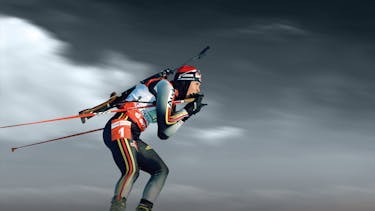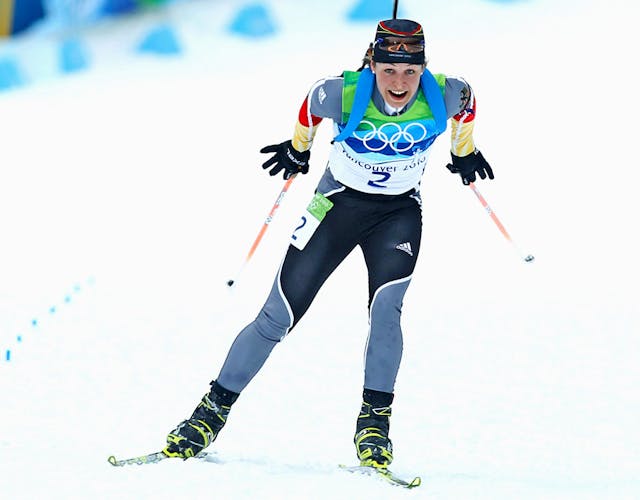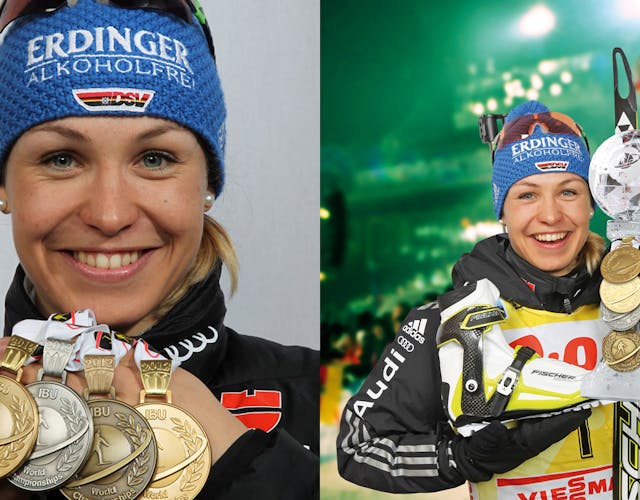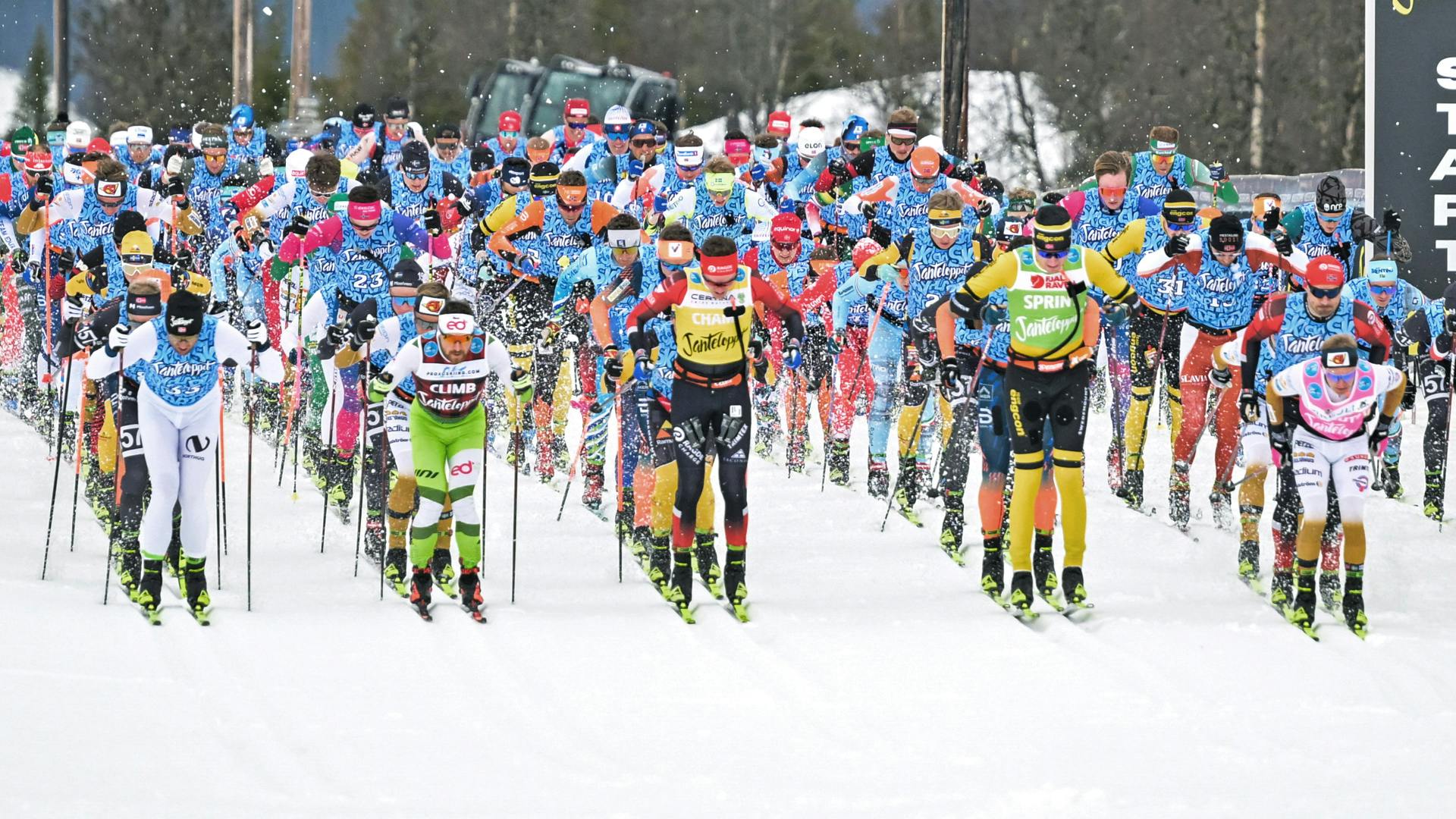„SPORT TAUGHT ME HOW TO BE AMBITIOUS AND CONSISTENT”
Although she ended her career at the age of 25, Magdalena Neuner has a place in history as one of the most successful woman biathletes ever. Named German Sportswoman of the Year in 2007, 2011 and 2012, she holds an impressive record with twelve gold medals in World Championships. In competitive sport - her “dream job” - she learnt to be “ambitious and consistent” for her later life. Neuner is also consistent in her relationship with Fischer: she got in touch by writing Fischer a letter at the age of 13. That was the beginning of a partnership that has remained close to this day.
When did you start with cross-country and biathlon?
In my first year at school, when I was six, I started training in cross-country with the skiing club – we trained once or twice a week with five or six kids from my class. Those were my first steps on cross-country skis. When I was nine they asked us if we wanted to take part in a biathlon – Anneliese Holzer provided the trial training. We just went along once, then we were automatically biathletes. For children that’s simply fascinating.
Did you use Fischer skis right from the word go?
At first you didn’t pay so much attention to the brand – the ski bag would contain a mixture. You might have two pairs of skis; four pairs was unusual. So when I arrived in the C squad, relatively early at the age of 16, it was quite a new experience to limit yourself to one ski company. At that point more than half the skis in my bag were from Fischer, and so I felt it was clear: I’ll take those in any case. That’s how it actually was – to some extent a reflex.
When you were 13 or so you wrote to Fischer to ask whether we would sponsor you. Whose idea was that?
Herbert Meier’s. In our family there were four children. It was always difficult. I never had more than two or three pairs of skis, while the others had several pairs. He noticed that I had some talent, and he probably felt a bit sorry for me. He suggested: “Write them a letter, go on.” And I thought I can give it a try – after all, I wasn’t risking anything. So then I actually wrote the letter by myself. Herbert had Tanja Winterhalder’s contact data, and he passed them on to me.
What difference did being sponsored make?
As a young athlete you had to finance everything yourself, and for me every single ski in my ski bag was sacred. Until then I had at most three pairs of skis. When we set off for a contest, the skis had already been prepared; you had to manage the whole weekend with what your dad had smeared on the skis on Thursday. With Fischer’s support I did then have more possibilities, with four or five pairs of skis.
So when did you get into closer touch with Fischer?
Not until the World Cup. In the Europa Cup – that’s what it was still called in those days – René Koch was our C-squad service man. For me that was completely new, but he always dealt with equipment sponsors. I just didn’t realise it. When I got to the World Cup at the age of 18 or 19, I naturally met the people face to face – particularly Grossi (Michael Grossegger).
Does anything special occur to you in connection with Fischer?
An experience? There were plenty. I always looked forward to the ski test when Grossi and Konni (Konrad Egger) were there. At major events, such as the Olympics, Grossi always took part in the testing. That was always fun. He’s the kind of person who doesn’t take anything all that seriously. He was very human and very kind. People who know him know what I mean. Sometimes we had to pull ourselves together and say: “Now it’s time to concentrate.” That was always very important to me: if you travel all over the place and stress builds up, it helps a lot if there are people around who you can have some fun with. Particularly in a highly competitive setting, it’s great if there are people around that you can unwind with.
Where do you get the power to make such a relaxed, poised impression in spite of all the stress?
The setting makes a big difference. It’s good to have friendly people around – good friends, that always provides plenty of energy. I try to have a good time at home, to spoil myself occasionally. As a general rule I try to do enough sport – when I do sport I’m a more balanced person.
Have you learnt anything in your life as an athlete that you can also benefit from in private life?
Well, I’ve learnt a great deal from sport. As an athlete you’re always under pressure to some extent. Now, after my sporting career, I can relax better or take time off. From sport I learnt to be ambitious and consistent. That was a great help to me during pregnancy, particularly in connection with food and drink. Other pregnant women just can’t do without coffee or cola – something I just couldn’t imagine. From day one I said: this I’m going to do, and that I’m not going to do. And I went through with it – something I’ve definitely learnt through sport.
If your child would like to do competitive sport, would you encourage that or not?
It doesn’t have to become an athlete, but if it wants to I’d certainly encourage it. That’s what my parents did, too: something I value to this day. Competitive sport was my dream job. I’m so grateful that I had the chance to do it, and glad that no one put obstacles in my path, and that they helped me with money, although that wasn’t easy. But I might mention the downside, too. That had to do with things that my parents didn’t know about. You don’t have to say that it’s terrible; nonetheless, competitive sport involves a lot of effort, making lots of sacrifices – and you have to adapt to that.
You’ve always said that for you a life independent of competitive sport also exists.
I find that extremely important. I’d pass that on to my child if it really turned out that it wants to do competitive sport. There is a life away from competitive sport, too, and you should take care to bridge the gap and not get stuck exclusively in this athlete’s life. It’s a good thing if you can also switch off, for your own sake. I’ve always had friends outside the world of sport, and been involved in village life to some extent. I wasn’t an athlete 24/7. That’s why it’s easier for me to let go of it all now. I looked forward to this new life, and especially that I can now do various things apart from sport that I had no time for during my career. That is important. I’m not sure whether athletes who live only for sport are ultimately that contented.
How would you describe your present life?
In any case it’s quite different now, of course. The biggest difference is that the regularity has gone. As an athlete you have to keep all sorts of rules. You know weeks in advance how your day will go. Everything goes by the clock. All of a sudden my days are at my disposal. A few appointments are fixed in advance. You have days when you have to fit your office stuff in somehow. You have your interview commitments, there’s the household to see to, plus all the other things. I had to organise that quite differently. That was the biggest change for me, but not necessarily negative. If I feel like it I can go cross-country skiing or go out for a jog in the morning. You can be more flexible, and that’s something you need to get used to, that the rules are no longer imposed from outside.
Do you do Alpine skiing, too?
I’ve always enjoyed Alpine skiing, too but my old boots were too small. I had cold feet the whole time and had to open up the buckles whenever I took the lift. Last year I tried the Fischer VACUUM FIT boot and I’m very enthusiastic about it. My new boots are a dream. I had boot heating installed, too – the perfect combination. Skiing last year was just great. I sat in the lift and raved on about my boots until my boyfriend couldn’t listen any more.
What was a real highlight in your athletic career?
That’s a tough one, as there are so many to choose from. Since I was so successful, there were a lot of highlights within six years. The World Championships in Antholz were awash with emotion for me. But then the Olympic Games in Vancouver were out of this world. When you stand there right at the top, they hand you the gold medal and you hear them play the German national anthem, it’s hard to beat. An Olympic gold medal is really something special.
„I'm very grateful for that. I'll never forget the successes and the emotional climaxes, such as the Vancouver Olympics. And Fischer was always part of it..”
You’re pretty busy, and yet you still have time for Fischer?
You don’t have such an intense relationship with every sponsor or supplier. Skis and boots were simply what I worked with, and so I have a special tie to them. Fischer always saw to it that I had top-rate material and that my ski bag had the best equipment for me – I’m very grateful for that. I’ll never forget the successes and the emotional climaxes, such as the Vancouver Olympics. And Fischer was always part of it. I still have my Olympic skis from Vancouver at home – they have very strong associations for me. That’s just one reason why I feel so close to the ski company that I actually grew up with.






